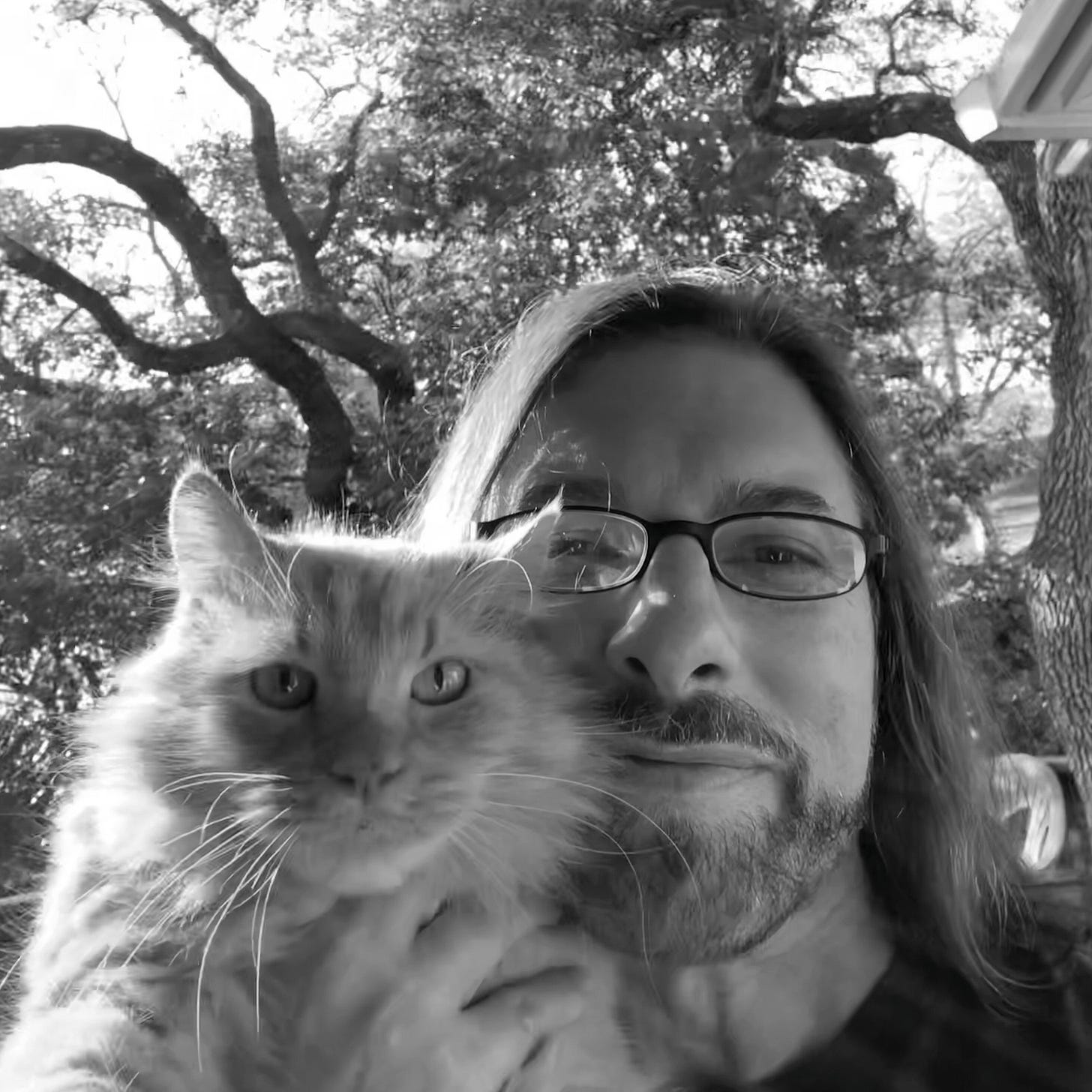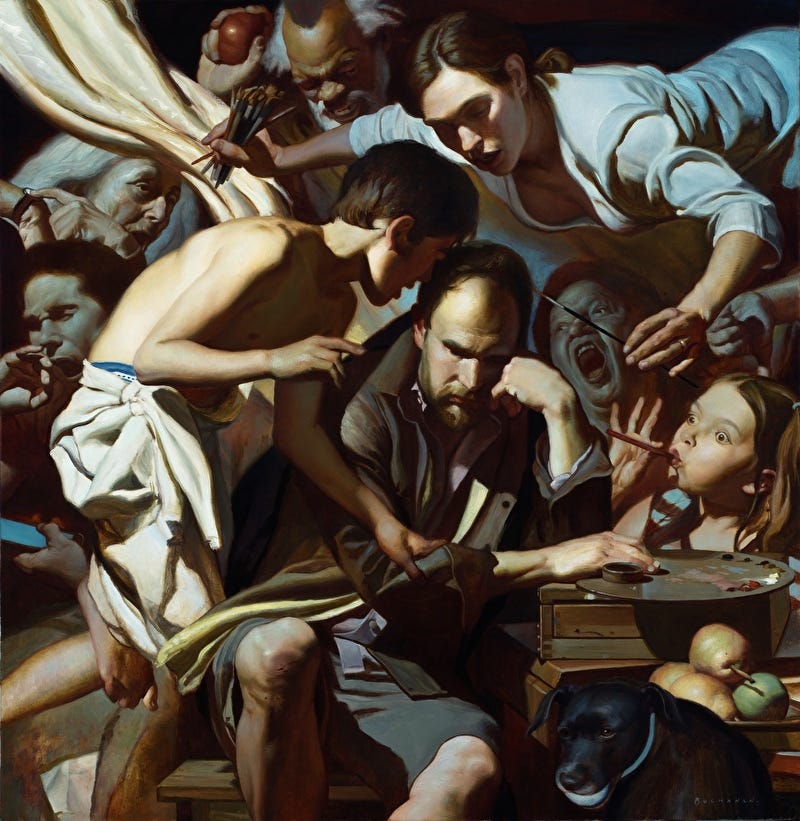The Call
That divine trumpet you hear calling you toward your true path is not only the horn of God, but may be someone else's call for divine help
This article originally appeared on my personal blog, Reflections of the Sovereign Artist, here.
Editor’s Note: In two days, this post will be locked and is available only to paid members because we don’t want this duplicate content on the open web in a way that might draw traffic away from the original post. You can always read the entire post here.
We are sharing this essay in The BoldBrush Letter because the underlying idea applies to all artists. Please enjoy.
In The Lion, the Witch and the Wardrobe, Father Christmas (a kind of John the Baptist style harbinger of Aslan’s coming) appears bearing gifts for the children. Susan is gifted a magical horn that brings aid when blown.
Although she drops the horn at the end of that book when the children return to England, it is found and eventually gifted to Prince Caspian, the rightful heir to the Narnian throne.
In Prince Caspian, Caspian is surrounded by the army of a usurper, Miraz. The situation has become desperate and so he takes out his most prized possession, the magical horn, and blows it, expecting help from Aslan or from the four original kings and queens of Narnia, Peter, Edmund, Lucy, and Susan.

“Then in the name of Aslan we will wind Queen Susan’s horn,” – Caspian, Prince Caspian
In England, a year has passed since the children’s original Narnian excursion (though far longer has passed in Narnia), and they all long to go back for another adventure. Narnia represents their true calling and their true names. Narnia represents The Kingdom within.
When Caspian blows the horn, Peter, Edmund, Susan and Lucy, in England, dreading their return to school, are pulled – are called – out of England and back into Narnia, though at first, they know not why.
Even though they have been summoned to Narnia, it is their choice as to whether or not they will truly answer the divine call and come to Caspian’s aid.
They must freely choose whether they will proceed in faith into the unknown adventure of their true calling. They must face the pull of their hearts with courage.
When each of us hear the trumpet of God, calling, through the pull of Wonder, through the experience of beauty, or through the revelatory power of intuition, we tend to focus on what it means to us, practically. We worry about what we will have to give up to follow our heart's yearning.
How many times have we each lacked the courage to follow the calling of our own innate creativity? How many people look back on their lives and realize they didn’t write that book, play their music, or paint their art?
Our ego tries to convince us we didn't truly hear a call – it must have just been our silly imagination. In The Magician’s Nephew, this egoistic attitude is how Uncle Andrew loses the ability to hear Aslan’s (God’s) voice:
Uncle Andrew tried to make himself believe that he could hear nothing but roaring. Now the trouble about trying to make yourself stupider than you really are is that you very often succeed. Uncle Andrew did. He soon did hear nothing but roaring in Aslan’s song.
Yet when we need help. When we call for God's help, through yearning and prayer, we tend to think he should jump to our aid and do our bidding, not considering that the very aid we are calling for is dependent upon the freewill and courage of another. Let us each hope that when we sound the magic horn, the person on the other end doesn’t resist the call like Uncle Andrew resisted.
The trumpet sound of our true calling is designed to crumble our ego and inflict a divine wound, just as the Israelite’s horns destroyed the walls of Jericho (a symbol of our ego, as the “city” that houses our baser fears, wishes and desires.)
The more we listen to the divine call, the more our ego burns away.
What we forget is that we, humanity, are most often the medium through which God acts and answers. It is through the body that one takes action, and we are told we are the “body of Christ.” In Narnia, the children and the talking animals often act as the “body” of Aslan.
Once back in Narnia, the children don't sit around and wonder why they were called, and they don't complain and lament that their plans had been spoiled, but, instead, they proceed, in faith in Aslan, and set out for adventure.
They shortly experience the first synchronicity whereby they the meet and save Trumpkin the dwarf who clarifies their path along this hero's journey. When we respond to The Call, the guide appears. As the old Zen proverb states, when the student is ready, the master appears.
The universe responds when you respond: It is the law of action and reaction.
Since we are all the medium through which help comes, consider when you hear your Call of destiny, it, might not only be God helping you, but may also be a call for you to help others.
The children's hearts yearned to be in Narnia, and God granted them their heart’s desire. And yet, simultaneously, and mysteriously, their love of Narnian adventure became the answer to Prince Caspian's plea to Aslan for help.
You hope for a Jinn to grant your wish, while never understanding that you are the Jinn that must answer another's plea.
As Edmund said, jokingly, when he realized it had been the magic horn that had called them back to Narnia:
“And now we know what it feels like for the Jinn,” said Edmund with a chuckle. “Golly! It’s a bit uncomfortable to know that we can be whistled for like that. It’s worse than what Father says about living at the mercy of the telephone.”
And Lucy finds the courage to respond to the Call:
“But we want to be here, don’t we,” said Lucy, “if Aslan wants us?”
James said, “faith, if it hath not works, is dead.”
We tend to think about our “Godly works” as residing in a narrow band of theologically defined “works” – as an obligation to feed the poor, go on a mission trip, or whatever else our pastor or our upbringing has taught us constitute “approved” good works.
Those are all worthy causes, but let’s consider that biologically, we are commanded to “go forth and multiply.” We would do that anyway. We are biologically called to procreate because, well, it feels good to our bodies.
Similarly, we are each soulfully called to create, to create our works of Art because it feels good to our souls.
Art, in this instance, refers to those things we are truly called to do – not just “the arts,” but those things at which we know represent our most authentic self and thus, the things we do most artfully. The saint is an artist who paints virtue into the medium of life itself. His life is his masterpiece.
Our deepest call, our deepest desire, impels us to take action as long as we find our courage, and produce works that feel good to our souls, while also helping others. Having faith is to have faith in the call of God, and faith in yourself to follow your call. Having faith means you do not discount the power of your unique calling. Having faith means you let go of guilt for wanting to do the thing you most want to do.
Before you discount this idea, think back over your own art career. Think about how many times someone has reached out to you to let you know that one of your works moved them to tears, that one of your works inspired them, that one of your works gave them courage, or even, that one of your works saved their life.
In my extremely short writing “career,” I’ve had numerous people tell me that something I wrote “happened” into their inbox at the exact moment they were about to give up on an important aspect of their true selves.
One lady told me she had never read a single one of our newsletters, but after a nasty unexpected divorce, felt impelled to read one and, after years of suppressing her true self, heard the call again. She saw a path forward in life that after years of suppression, once again included her Art. And, in one case, a person reached out to me privately, and said that she had been considering taking a drastic action to give up on life. She decided to read one of our newsletters, and said it was the right message at the exact right moment. It inspired her to pick herself up and put herself on a path to move forward and get help.
Consider that what you feel as God calling you down a certain path that resonates with your soul is someone else blowing the magic horn that calls for help. And that answering that call is not something you should feel guilty about, but instead, answering it provides the evidence, the works, of your faith and thus, is the most important thing you can do.

Then, after an awful pause, the deep voice said, “Susan.” Susan made no answer but the others thought she was crying. “You have listened to fears, child,” said Aslan. “Come, let me breathe on you. Forget them. Are you brave again?” – Aslan, Prince Caspian
I’m extremely intrigued by this idea of Art changing lives, so would you do me a favor?
I would love for you to share, in the comments by clicking the button below (or by emailing me directly with a reply), any story you have of someone who has contacted you to tell you how your Art has come to someone’s aid and helped them at exactly the moment they needed uplifting.

FASO Loves Noah Buchanan’s Paintings
See More of Noah Buchanan’s Paintings Here
Wouldn’t You Love to work with a website hosting company that actually promotes their artists?
As you can see, at FASO, we actually do, and,
we are the only website host we know of that does.
Click the button below to start working
with an art website host that actually cares about art.
Referenced Posts
The Divine Singularity in our Core
How to Grow Humanity’s Creativity
The Healing Virtue of the Virtuoso
No AI Zone: Everything written in this post (and all my posts) is written 100% by me, Clint “Clintavo” Watson, a flesh and blood human seeking to grow my soul and come home my truest self; for that is the essence of creativity. I do not use AI to assist me with writing — that would deny me the very growth of my world through writing that I seek.
I only rarely use AI images with my (non-AI) writing. On the rare occasions I do use an AI image (usually fiction), I also feature at least one artwork by a human artist with image credits and links to their work or, if I can’t find a suitable image, I donate a free month of website service to one of our artist customers at my SaaS company, FASO Artist Websites.
Poetic expression, spiritual ideas, and musings upon beauty, truth and goodness should be free to spread far and wide. Hence, I have not paywalled the work on Reflections of the Sovereign Artist. However, if you’re able to become a paid subscriber, I’d be eternally grateful. It would help, encourage and enable me to continue exploring these topics and allow me to keep it accessible for a world that is in desperate need of beauty, truth, goodness and love. — Creatively, Clintavo.




